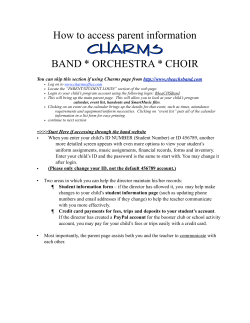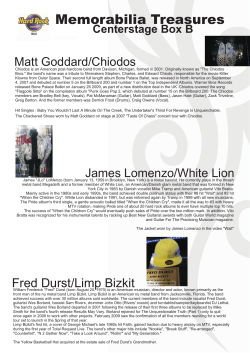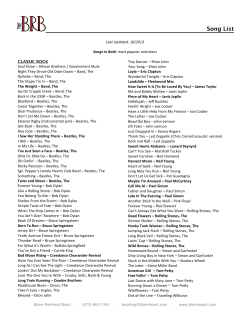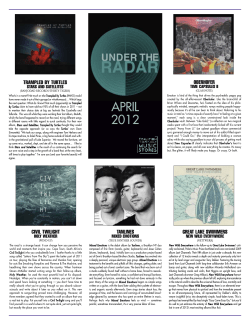
ABOUT TO FOR THOSE
FOR THOSE 18 ABOUT TO EMERGING ARTISTS MAY PREFER TO FOCUS MORE ON MAKING MUSIC THAN ON IP ISSUES, BUT THIS CAN LEAD TO NASTY DISPUTES AND SOUR NOTES DOWN THE LINE, AS ALASTAIR RAWLENCE WARNS *Source: For Those About To Rock (We Salute You), AC/DC, Angus Young, Malcolm Young, Brian Johnson M ost bands are like couples planning to get married; they don’t want to think about what might go wrong in the future and tend not to regard prenuptial agreements as very romantic. But, of course, like couples, bands do break up, members change and arguments arise, many of these driven by disputes over money. Over the years, musicians have become more astute about the importance of establishing a band partnership agreement that addresses potentially contentious issues, such as input into business, creativity and performing decisions, equipment acquisition (and ownership), and each members’ share of income from performance and royalty payments. However, one issue that frequently still gets overlooked is the question of who owns the band’s name. The history of rock and roll is littered with acrimonious, costly and often embarrassing disputes between former friends and bandmates over the right to use the name of their disbanded musical group. The value of a good name Although a band’s name may not seem very important to the musicians at the time of a group’s creation, it is one of its most valuable assets, particularly when it comes to merchandising. A rock group’s promotional activity was once limited to the odd concert T-shirt; these days, many artists have expanded their licensing and endorsement activities into more exotic sectors – from perfume (Britney Spears), make-up (Lady Gaga) and fake eyelashes (Girls Aloud), to condoms (JLS), dolls (One Direction), deodorants (Spice Girls), vodka (Puff Daddy), suntan lotions (Pussycat Dolls) and even butter (John Lydon, Public Image Ltd/Sex Pistols). itma.org.uk June 2014 018-021_ITMA_JUNE14 MUSIC2.indd 18 13/05/2014 09:56 E N T E R TA I N M E N T 19 Although a band’s name may not seem very important to the musicians at the time of a group’s creation, it is one of its most valuable assets, particularly when it comes to merchandising itma.org.uk June 2014 018-021_ITMA_JUNE14 MUSIC2.indd 19 15/05/2014 11:07 With such potentially high revenues at stake, taking legal advice when choosing and protecting a band name is crucial for every group. Ideally, it should be taken care of before a band becomes popular and big money becomes involved. 20 Who should own the name? Just because, say, the guitarist came up with the group’s name, it doesn’t or shouldn’t mean that it belongs to him or her. A band’s partnership agreement should clearly address the question of ownership, and what happens if the group splits or changes members. This could specify, for example, that one or all of the band members or even someone (or some entity) outside the band owns the name. As part of this process, and as with any brand, it is also advisable for bands to undertake a trade mark search to check that no one else is already using the chosen name. Otherwise, they may be forced to change their name at the last minute, as with US band Blink, which changed its name to Blink 182 after receiving a challenge from an Irish band of the same name; Polar Bears, which became Snow Patrol following a threat by Jane’s Addiction’s former bassist, who was fronting a band of the same name; and The Dust Brothers, which became Chemical Brothers to avoid a conflict with US producers of the same name. Trade mark registrations in appropriate territories and classes will then shore up the band’s right to use its chosen name moving forward. With the range of merchandising activities now so varied, these should extend beyond the obvious goods in classes 9 (video/sound recordings) and 41 (entertainment services) to cover additional products and services. Once registered, the partnership agreement should also set out rules surrounding the ownership and use of those marks, and oblige the parties to relinquish and assign their rights to use the mark under specific circumstances; for example, in the event of the departure or sacking of a band member. After the fact But, what happens if a band hasn’t set up a band partnership agreement or addressed within it the question of trade mark or band name ownership? In the absence of such an agreement and/or registration, the law will consider the original members of the band (who joined at the same time) to be partners, with equal rights to share the profits and With such potentially high revenues at stake, taking legal advice when choosing and protecting a band name is crucial for every group assets of the partnership. In other words, all band members will be deemed to have an equal share of the band’s name, irrespective of which member actually created it and which member is the face of the band or its main creative force. Unsurprisingly, this often leads to litigation after a band splits and one or more of the members seek to continue using the band’s name. High-profile examples, include: • The legal action by founding member and The Dark Side of the Moon lyricist (among other works) Roger Waters to dissolve the Pink Floyd partnership after leaving the group, and to block the group from continuing without him. The case was eventually settled out of court, enabling the other band members to continue performing under the name Pink Floyd. As part of the agreement, Waters reportedly also retained the copyright to the concept behind The Wall and his trade-marked inflatable pig. • The attempt by former (and founding) Sugababes member Mutya Buena to register the band’s name as a Community Trade Mark (CTM) in 2009. After lengthy opposition proceedings by the Sugababes partnership and the band’s record label, OHIM granted a registration in Buena’s favour – but only in respect of “Paper, cardboard and goods made from these materials, not included in other classes; stationery; paper gift wrap and paper gift wrapping ribbons”, which is probably not what Buena had initially hoped for. • The disputes between members of The Beach Boys following the band’s split in the late 1980s and, in particular, the infringement action mounted against guitarist Alan Charles “Al” Jardine by his former bandmates after he began touring under different variations of the band’s name. Singer-songwriter Mike Love had negotiated a deal with the band’s corporate entity, Brother Records Inc, which guaranteed him the rights to the name as the sole licensee. He paired up with the Carl Wilson estate to sue Jardine for $2.2 million in legal fees. itma.org.uk June 2014 018-021_ITMA_JUNE14 MUSIC2.indd 20 13/05/2014 09:57 Solo move Sometimes, one band member will decide to register the group’s name as a trade mark without involving the others. This was the case with Black Sabbath guitarist Tony Iommi, who obtained registrations in the UK, European Union and US, leading to a lawsuit between him and Ozzy Osbourne in 2009. The parties eventually reached an agreement and all three registrations have now been assigned jointly to Iommi and Osbourne. A similar dispute arose over the rights to the Frankie Goes To Hollywood name, after frontman Holly Johnson tried to register the iconic name as a UK and CTM right without informing or gaining permission from the other band members following the group’s split. His former band members subsequently opposed the application, arguing it was made in bad faith and that they had unregistered rights to the mark acquired through use. Although Johnson had come up with the band’s name, his attempt to register the mark was successfully prevented as the UK IPO and OHIM upheld the Bitter, and often silly These examples illustrate how bitter, and sometimes silly, disputes over the rights to use a band name can become. As with any business or industry, the founding partners may eventually disagree or simply decide to move on or look to enter new ventures. For that reason, bands are advised to draft a partnership agreement that clearly states who owns the associated trade mark rights, and what will happen to them should they eventually decide to go their separate ways. E N T E R TA I N M E N T Much like a prenuptial agreement, the idea is to help make the break-up process as painless as possible, so it should ideally include provisions that address possible scenarios following that split. For example, it could assign the right to use the band name and/or trade mark to the majority of the group members, so that they can continue to perform together. Alternatively, it could assign it to the lead singer only, regardless of who he or she is performing with, or the sole songwriter, or to the record label itself. In certain cases, the band may decide that no one should be allowed to use the name should the group break up. The agreement should also define what “leaving” a band actually means and, if relevant, how many of the original members of the band need to remain to retain use of the band name. Protecting the band’s name in this way isn’t just a means of avoiding costly, long-winded and embarrassing disputes between band members, it’s also a method of protecting and growing the value of the band name as an asset. Taking the necessary steps at the start – clearing the name, registering it and clarifying ownership – is crucial if a group is to ensure the use of the name without risk of infringement or arguments between band members. Most importantly, it leaves the band free to do what it really wants to do: create music. 21 Bands are advised to draft a partnership agreement that clearly states who owns the associated trade mark rights, and what will happen should they split opposition, agreeing that the name was owned equally by all original band members and that no one band member had the right to claim exclusivity to that name. It may seem unfair, but the long-running battle over the rights to the Bucks Fizz band name also shows what can happen to a group member’s rights after leaving a band. A trade mark for this group was registered in the name of Heidi Manton, a member of the current line-up using the band’s name, and attempts to revoke that registration by the original members have proved unsuccessful. In addition, their application for a trade mark for “The Original Bucks Fizz” was also rejected by the UK IPO, which stated that the original band members had given up any rights to the trade mark after leaving the group. Alastair Rawlence is a Senior Trade Mark Attorney at Novagraaf UK a.rawlence@novagraaf.com Based in the Manchester office, Alastair acts for several music business clients, including Peter Hook (New Order and The Light) and, more recently, legendary 1970s rockers Hawkwind. Magdalena Borucka is a Trainee Trade Mark Attorney in the London office of Novagraaf UK and acted as co-author. m.borucka@novagraaf.com itma.org.uk June 2014 018-021_ITMA_JUNE14 MUSIC2.indd 21 13/05/2014 09:57
© Copyright 2025





















